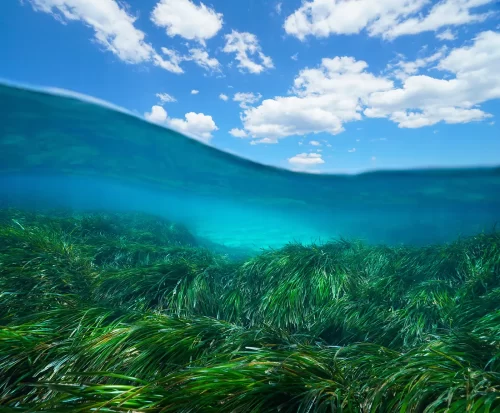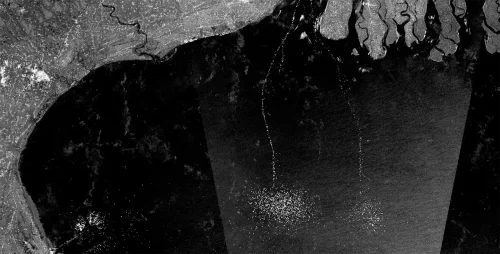Oceana calls on U.S. government to reduce illegal, unreported and unregulated fishing in the US seafood supply chain
The largest ocean-focused advocacy group, Oceana, released results from a new poll revealing that 83 percent of Americans agree that all seafood should be traceable from the fishing boat to the dinner plate, and 77 percent support requirements for all fishing vessels to be publicly trackable.
At Global Fishing Watch, we believe that increased transparency of human activity at sea is critical to improved ocean governance. We are excited to see that support for public vessel tracking in the U.S., a major seafood market, is so high.
The poll also indicated that nearly 90 percent of Americans agree that seafood caught using human trafficking and slave labor should not be bought or sold in the U.S.
A study released by Global Fishing Watch and partners at University of California, Santa Barbara and Liberty Shared in December 2020 found that satellite data and machine learning can inform the risk of forced labor, a type of modern slavery, on fishing vessels. With further development, these methods could be used by authorities to inform enforcement.
We spoke with Jacqueline Savitz, Chief Policy Officer for North America at Oceana and co-founder of Global Fishing Watch to better understand how the U.S. can take action to respond to these survey results and reduce illegal, unreported and illegal fishing (IUU) in their supply chains.
Q: What did you find most revealing in the poll results?
The poll confirmed what we had hoped — that there is strong bipartisan support to expand transparency, end illegal fishing and stop seafood fraud. Americans agree that all seafood sold in the U.S. should be safe, legally caught, responsibly sourced and honestly labeled. Now it’s time for governments to enact policies that promote transparency, extend traceability and increase enforcement to prevent seafood fraud and illegal fishing once and for all. Global Fishing Watch helps — it makes a lot of things transparent, like where vessels are fishing, and that can help increase accountability and enforcement.
Q: What key actions should the U.S. government take to increase seafood traceability and vessel tracking?
The U.S. should help combat IUU fishing and seafood fraud by taking the following steps:
- Expanding traceability by requiring catch documentation for all seafood that is imported into the U.S. This can be done by expanding the Seafood Import Monitoring Program.
- Requiring all vessels larger than 50 feet to use the automatic identification system (AIS), a public vessel tracking technology.
- Extend traceability requirements so that all seafood is tracked from boat (or farm) to plate.
- Enhance risk-based auditing and enforcement by using data-driven tools and technologies, like Global Fishing Watch, to better screen for illegally sourced or fraudulent seafood products.
Q: What kind of global impact can the U.S have by improving its own seafood traceability?
As a major seafood market, the U.S. should demand that the seafood it imports is legally caught, properly labeled and not sourced using forced labor or other human rights abuses. Doing this could drive change in the industry. The U.S. also has an opportunity to be a global leader in the fight against IUU fishing by taking these and other actions, as it would set a standard for other countries. We should demand transparency with regard to fishing, we should insist on catch documentation for all seafood, we should put in place and require full-chain traceability and we should improve our screening of imports — and then we should urge other countries to do the same.
Q: How can technology and innovation help combat illegal fishing and seafood fraud?
Tools like the Global Fishing Watch platform are a game changer in combating illegal fishing and seafood fraud. What was once hidden far beyond the horizon is now visible to anyone with an internet connection. The Global Fishing Watch platform takes advantage of emerging technologies like machine learning and satellite data gathering, to offer governments, fishery managers, and really anyone, a powerful tool to help monitor fisheries and identify bad actors. And what’s more, all this data can be analyzed to identify trends and flag anomalies, and that is invaluable in the fight against illegal fishing and seafood fraud.
Q: What can governments be doing to tackle and prevent human rights abuses occurring in the fisheries sector?
Governments need to adopt policies to guarantee that seafood is not illegally caught, and the transparency and traceability policies I described earlier help to do that. By identifying suspicious vessels and then monitoring them more closely, Global Fishing Watch can help expose human rights abuses in the seafood sector and create a deterrent for the types of behaviors that lead to such abuses. For instance, vessels that remain at sea for extended periods, months or more, should receive greater scrutiny. When violations are identified, import controls should be used to ensure those vessels are not benefiting, which will reduce bad behavior. This has to be done in multiple major markets, not just the United States, but it could go a long way to ending abusive practices in the fishing sector. Major markets, like the U.S., have a responsibility to ensure that our seafood purchases are not driving human rights abuses around the world. By requiring vessels to be publicly trackable and by expanding traceability of all seafood from boat (or farm) to plate (including requiring information about how that seafood was caught and processed), the U.S. can better screen seafood to ensure that U.S. dollars are not supporting human rights abuses in the seafood sector.
By 2030, Global Fishing Watch aims to monitor and visualize the impact of ocean-going vessels, both industrial and small-scale, that are responsible for the vast majority of the global seafood catch. Achieving this goal will require collaboration with a variety of partners, including governments, to make vessel tracking possible. Global Fishing Watch remains committed to supporting collaborations with various actors through scientific and innovative solutions for open and effective fisheries monitoring.
Samantha Emmert is a communications and outreach manager at Global Fishing Watch.


